 落葉 Fallen Leaves
落葉 Fallen Leaves 落葉 Fallen Leaves
落葉 Fallen Leaves
葉落不隨流水去, 化作春泥還護花
Do not go with the running water, the fallen leaves turn into spring mud and protect the flowers.
「被遺忘的年代 - 誰來追尋幌馬車之歌」 原載 1990-01-11 自立早報
1994-07-07 改編為多媒体
"The Forgotten Age - Who Will Seek the Song of the Caravan" Originally published on 1990-01-11 Independent Morning Post
1994-07-07 Adapted to Multimedia
本計劃應用 VIKON 多媒体管理系統進行編輯及播放,內容包括:
This multimedia uses VIKON multimedia management system for editing and playback, including:
第 一 篇 馬戲團歌手(一) Circus Singer (1)
第 二 篇 馬戲團歌手(二) Circus Singer (2)
第 三 篇 大溪隱者(一) The Hermit of Dasi (1)
第 四 篇 大溪隱者(二) The Hermit of Dasi (2)
第 五 篇 萊茵河女妖與夜來香(一) Loreley and Lovely Flower of the Night (1)
第 六 篇 萊茵河女妖與夜來香(二) Loreley and Lovely Flower of the Night (2)
第 七 篇 萊茵河女妖與夜來香(三) Loreley and Lovely Flower of the Night (3)
第 八 篇 萊茵河女妖與夜來香(四) Loreley and Lovely Flower of the Night (4)
第 九 篇 留白的歲月(一) Blank Years (1)
第 十 篇 留白的歲月(二) Blank Years (2)
第 十一 篇 禁忌的遊戲(一) Forbidden Games (1)
第 十二 篇 禁忌的遊戲(二) Forbidden Games (2)
第 十三 篇 誰來追尋幌馬車之歌(一) Who Will Pursue the Song of the Caravan (1)
第 十四 篇 誰來追尋幌馬車之歌(二) Who Will Pursue the Song of the Caravan (2)
This website is sponsored
by VIKON Corp.
Copyright July 1996.
All rights reserved.
Last update : 1999-11-01
有什麼建議嗎 ? 來信請寄:
 vikontony@gmail.com
vikontony@gmail.com
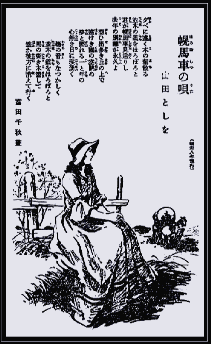
第一次聽到「幌馬車之歌」應該是 1958 年 那年父親把積蓄數年,預備訂製西裝的預算,大約二千塊台幣 換來一部附有唱盤的真空管收音機 是個深秋的夜晚,家人正在聆聽唱片 門口忽然傳來一陣歌聲與音樂相和 我好奇推窗外望,只見一位中年婦女,靠在牆邊低聲唱歌 猛然發現有人探頭,有點不好意思 母親知道她在市場賣肉,於是請她進來 歐巴桑說,她從我家經過,經常聽到熟悉的音樂 所以忍不住,唱了出來 原來她曾是馬戲團的首席歌手,台灣光復後,戲團解散,她也嫁為人婦 丈夫是個肉販,所以她在市場看攤 The first time I heard "Who Will Pursue the Song of the Caravan" was probably in 1958. That year, my father saved about 2,000 Taiwan dollars for several years. Instead of buying a custom-made suits, he use the budget to Get a vacuum tube radio with a turntable. It's a late autumn night and the family is listening to records. For a short while, outside the door, along with the music comes a sing. I pushed out the window curiously and saw a middle-aged woman leaning against the wall and singing in a low voice. Suddenly found someone probe, she turned red with embarrassment. Mother knew she was selling meat at the market, so we invited her in. She said she passed by our house and often heard familiar music, So she couldn't help but sang it. It turned out that she was the chief singer of the circus. After the War, the circus was disbanded, and she also married a man. Her husband is a butcher, So she takes care of the stall at the market.
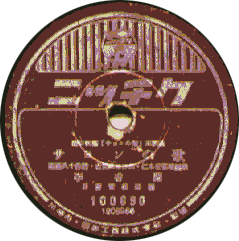
母親和她聊完一些瑣事,我趁機央她唱歌 此後她偶而會到我家 有時沉醉音樂聲中,默然無語 興致來時便高歌一曲 記得她有一項絕活 可以模彷男聲,唱出宮本武藏的「花之小次郎」 至於「幌馬車之歌」「沙鴦之歌」,「 MARIA MARIA」「紅屋之娘」 這類歌曲,唱起來一點也不含糊 當年的我,正值青春期 頗能體會那種寄情音樂,渾然忘我的浪漫氣氛 不久,電唱機日漸普遍 歐巴桑來家裡的次數銳減 這段音樂之旅,便告中止 After my mother chatted with her about some trivial matters, I took the opportunity to ask her to sing. Since then she will occasionally come to my house. Sometimes intoxicated by the sound of music, she was silent. When the mood comes, she sings a song in seriously. I remember she has a unique skill. She can imitate the male voice and sing Miyamoto Musashi's "Hana no Kojiro" As for "Song of the Caravan", "Song of Sayoung", "MARIA MARIA", "The Lady of the Red House" These songs are sung professionally. I was in adolescence at that time. Therefore I can quite understand the kind of emotional music, and enjoy the romantic atmosphere of forgetting myself. Soon, record players became more popular. Her visits to our house gradually decreased. This musical journey comes to an end finally.
大溪隱者(一) The Hermit of Dasi (1)
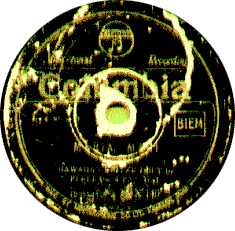
數年後我負笈台北 曾在桃園鄉下,看到一架手搖留聲機 這種機器,只能播放 78 轉唱片 轉盤靠發條上緊,不需供給電源 唱針就像鋼釘,用手工在刀石上磨尖後,固定於圓形唱頭 唱盤轉動,舒伯特的小夜曲便從喇叭輕瀉而出 留聲機主人,守著一片小店 出售日用雜物,閒時聽歌自娛 櫃台左邊有個木櫥,置放唱片 從精緻的商標可以看出,哥倫比亞和有隻蹲狗的勝利牌,佔大部份 唱片中除了古典音樂以外,還有西班牙探戈,日本古樂和流行歌曲 看來數量頗豐 After a few years, I was in Taipei for college study. Once in the countryside of Taoyuan, I saw a hand-cranked gramophone. This machine can only play 78 RPM shellac discs. The turntable is wound by the mainspring, no power supply required. The stylus is like a steel nail, sharpened by hand on a knife stone, and fixed to the round cartridge. As the turntable turns, and Schubert's serenade pours out of the trumpet. The owner of the gramophone, guarding a small shop. Sell daily sundries and entertain himself by listening to music in his leisure time. There is a wooden cabinet on the left side of the counter for storing discs It can be seen from the delicate logo of most disks are "Columbia" and the victory label with a squatting dog. In addition to classical music, the album also includes Spanish tango, Japanese ancient music and popular songs. It seems to be a lot.
大溪隱者(二) The Hermit of Dasi (2)
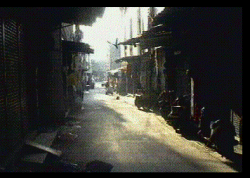
吳先生大約六十來歲 談到唱片,如數家珍 濃厚的書卷氣外,感覺上隱約帶著一絲落莫 據我推測應是舊制中學畢業,說不定還上過大學 我正奇怪,這樣的人怎會擺攤營生 只是當時天色已晚,又是萍水相逢,不敢妄加探詢 話別後未再聯絡 但是老人的音樂素養和談吐風采,卻讓我印象深刻 三,四年前,舊地重遊,亟思再訪故人 奈何人事已非,終不復尋 Mr. Wu is about sixty years old. It sounds like keeping many treasures When he talks about dicks. In addition to the strong bookish atmosphere, there is a vague sense of desolation. According to my guess, he should be graduated from the old system high school, maybe even went to university in Japanese era. I'm just wondering, how can such a person set up a stall to make a living. However, it was late at that time, and we just met by chance, so I didn't dare to inquire more. We didn't contact after saying goodbye. But the old man's musical literacy and conversation style impressed me deeply. Three or four years ago, I revisited the the old market, thinking about revisiting the old people. However, old friend was gone, and he will never be found again.
萊茵河女妖與夜來香(一) Loreley and Lovely Flower of the Night (1)
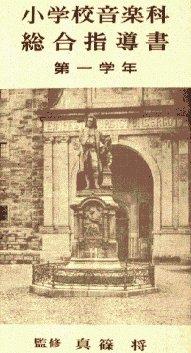
「悲情城市」有一節文青和寬美聆賞羅蕾萊(The Loreley)的片段,相當感人 記憶中的父執輩親友,大都喜歡唱歌 他們不只唱流行歌,也唱民謠和所謂的世界名曲 戰前市區水準較高的小學畢業生 對古典音樂的認知 恐怕會使今天的大學生汗顏[註一] [註一] 小學音樂鑑賞教材中,歌劇戲曲,古典音樂佔大部份 中學三年,聲樂曲和器樂曲範圍更廣 參見「中小學校音樂科總合指導書」計九冊 日本全音樂譜社出版 1960-1962 百餘位當代日本音樂教育工作者聯合著述 多數執筆者初次任教年代最早為 1928,稍晚的也在 1940 年前後 從時間上推算,這些人正好是當年在台從事中小學教育者的同輩人物 In the movie "City of Sadness", there is a section of Bun-tshing and Khuan-bi listening to "The Loreley", which is quite touching. In my own memory, most of the relatives and friends of my fathers like to sing songs. They not only sing pop songs, but also folk songs and so-called world famous songs. I guess the knowledge of classical music of higher-quality primary school graduates in pre-war urban areas will make today's college students ashamed. [Note 1] [Note 1] In primary school music appreciation textbooks, opera, drama and classical music account for the majority. In middle school, a wider range of vocal and instrumental music were introduced. Please refer to the nine volumes of the "General Instructions for Music Subjects in Primary and Secondary Schools" Published by Japan All-Music Notation Society 1960-1962 Co-authored by more than 100 contemporary Japanese music educators. Most of the writers first taught as early as 1928, and later in 1940. In the period of the time, these people happened to be the same generation who were engaged in primary and secondary education in Taiwan.
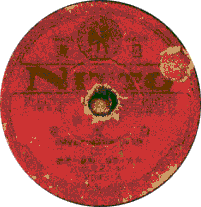
十多年前,我在某機構任職 有位會彈鋼琴的同事和女友閒聊 順口說台灣人不懂欣賞音樂,只配聽歌仔戲 那時血氣方剛,免不了反唇相譏 其實,歌仔戲也沒有什麼不好 只是小時候常聽母親吟唱世界名歌 從西洋文學中也略知萊茵河女妖的典故 於是祭出這首「名曲」 雖沒讓他灰頭土臉,也算替台灣人出一口氣 1983 年夏天,為了搜集日據時代台灣人的生活背景資料 我開始進行一些田野調查工作 從資料上研判,戰前日本推行「皇民化運動」 雖然有意貶低台語歌曲,仍未禁絕或醜化本土音樂 光復初期,台灣人照樣能說能唱優美典雅的台語和民謠 (背景音樂: 歌仔戲 - 白虎堂(穆桂英) 陳玉安詞 陳秋霖曲) (永吉 雪梅 阿嬰 秀鑾 主唱 日東唱片發行) More than ten years ago, I worked in a company. A colleague who can play the piano is chatting with his girlfriend. "Taiwanese people don't know how to appreciate music, they only deserve to listen to Taiwanese Opera." He said. At that time, my blood was strong, and it was inevitable for me to make a retort. In fact, there is nothing wrong with Taiwanese opera. It's just that when I was a child, I often heard my mother sing the world famous songs. Knowing the Allusions of "Loreley" from Western Literature, So I told him this "famous song." Although it didn't make him disheartened, it was considered a relief for the Taiwanese. In the summer of 1983, in order to collect background information on the life of Taiwanese during the Japanese era. I started doing some fieldwork research. Judging from the data, before the war Japan carried out the "Emperorization Movement." Although intentionally demeaning Taiwanese songs, it has not banned or vilified local music. In the early days during the period of after War, Taiwanese could still speak elegant Taiwanese and sing beautiful Taiwanese folk songs. (Background Music: Taiwanese Opera - White Tiger Hall (Mu Guiying) lyrics by Chen Yuan and music by Chen Tshiulin) (Ying-kiat Suat-mue A-ying Siu-luan lead vocals released by Jit-tong Records)

早期的台灣音樂創作者如陳達儒,鄧雨賢
陳秋霖,陳君玉,陳玉安等人的作品
都曾灌製唱片,廣泛發行[註二]
若干台灣名謠甚至被改編成日本歌曲 [註三]
[註二] 白虎堂(穆桂英): 陳玉安詞 陳秋霖曲 日東唱片
鳳嬌嘆: 陳達儒詞 文藝部編曲 勝利唱片
戀愛風: 陳君玉詞 王福(彩)譜 勝利唱片
夜來香: 陳達儒詞 陳秋霖 曲 勝利唱片
[註三] 栗原白也曾將鄧雨賢的作品「 雨夜花」「月夜愁」
配上日文歌詞,由日本哥倫比亞唱片灌製發行
台灣光復後,原由周添旺作詞
鄧雨賢作曲的月夜愁
經老牌歌星文夏另行灌唱 78 轉唱片
由亞洲公司發行,曾經風靡一時
(背景音樂: 夜來香 陳達儒 作詞 陳秋霖 作曲)
Early Taiwanese music creators such as Tan Tat-lu, Ting U-hian
Works by Tan Tshiu-lin, Tan Kun-giok, Tan Giok-an and others
They have all recorded and distributed widely[Note 2]
Several famous Taiwanese ballads have even been adapted into Japanese songs [Note 3]
[Note 2] Peh-hoo-tng (Mu Guiying): lyrics by Tan giok-an, music by Tan Tshiu-lin, Nitto Records
Fong-Kiau Tham: lyrics by Tan Tat-lu, music by Literary Department of Victory Records Company
Luan-Ai-Hong: Lyrics by Tan Kun-giok, music by Ong Hok-tshai, Victory Records
Lovely Flower of the Night: lyrics by Tan Tat-lu, music by Tan Tshiu-lin, Victory Records
[Note 3] Kurihara Hakuya used Ting U-hian's works "Rainy Night Flower" and "Moon Night Sorrow"
rewritten to Japanese lyrics, produced and released by Japan Columbia Records
After the War, the original song of "Moon Night Sorrow" (lyrics written by Tsiu Thiam-ong and
music by Ting U-hian)
was sung by veteran singer Bun-Ha on a 78-rpm record
Published by Asian company. It was all the rage.
(Background music: Lovely Flower of the Night, lyrics by Tan Tat-lu, music by Tan Tshiu-lin, Victory Records)
萊茵河女妖與夜來香(四) Loreley and Lovely Flower of the Night (4)
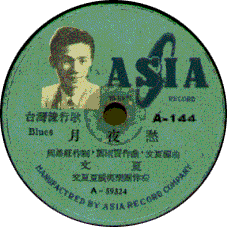
從
堆裡陸續發現的證據
充分說明了殖民統治時期的台灣人
不僅唱世界名歌,聽歌仔戲,還創作為數不少的「台灣歌仔」
如果音樂確是一種文化
那麼它所反映的時代背景,其內涵之豐富當超乎我們想像之外
這些鄉土音樂在戰爭餘燼裡被留存下來,想當年必有一段風光歲月
然而曾幾何時,台語卻像猶太人胸前的黃牌
台灣歌謠也成了低俗不雅的象徵
知識份子輕視排斥,中產階級不屑一顧
只有那販夫走卒,擔蔥賣菜之餘,咿咿喔喔唱將起來
本土歌謠的沒落,正是臺灣人命運的觀照
(背景音樂: 月夜愁 周添旺 作詞 鄧雨賢 作曲 文夏 演唱)
Evidence successively discovered from the pile of shellac discs
shows that during Japanese colonial era, a full account of Taiwanese people
not only sing world famous songs, listens to Taiwanese opera, but also creates a lot of "Taiwanese songs"
If music is indeed a culture
then the background of the time that reflects the richness of its connotations should be beyond our imagination.
These local music were preserved in the embers of the war, and I think they must have been a glorious time in those days.
But once upon a time, Taiwanese was like a yellow card on the chest of a Jew.
Taiwanese ballads have also become a symbol of vulgarity.
Intellectuals despise exclusion, middle class dismissive.
Only the peddler, who was carrying onions and selling vegetables, was about to sing.
The decline of local songs is a reflection of the fate of Taiwanese.
(Background music: Moon Night Sorrow, lyrics written by Tsiu Thiam-ong and music by Ting U-hian, singing by Bun Ha)
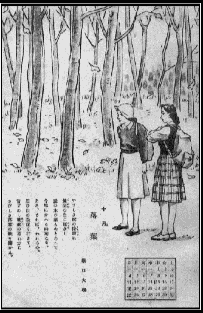
以日文做為文字語言的台灣人,如何看待世事? 他們的情感是細緻,還是粗糙? 戰後四十年間,他們的生命力和當代社會脈動有何關連? 這些問題實在值得觀察與了解 同一時期,閱讀「請問芳名」,「人間的條件」 這類作品的日本人和台灣人心境有何差別? 比起同輩的台灣人 戰後被遣送回國的日本讀者可能幸運多了 我曾訪談數位 1920 年代出生的老婦人 從塵封已久的記憶裡,娓娓道出童年舊事 她們依稀記得,秋末遠足 沿途歌聲盈耳,落葉滿地 年代雖遠,色彩依舊十分鮮明 How do Taiwanese who use Japanese as their written language view the world? Are their emotions subtle or rough? In the forty years after the war, how is their vitality related to the pulse of contemporary society? These issues are worthy of observation and understanding During the same period, What is the difference between the mentality of Japanese and local Taiwanese when they read read "Onamae wa?" and "Ningen no j?ken"? Compared with local Taiwanese of the same generation Japanese readers who were repatriated after the war were probably luckier. I had interviewed several elderly women born in the 1920s. From the dusty memory for a long time, tell the old events of childhood, they vaguely remember, hiking in late autumn. Along the way, the singing is full of ears, and the leaves are all over the ground. Although the age is long, the color is still very bright.
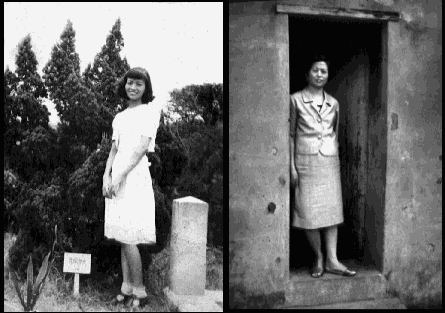
時光的消逝 並未讓她們遺忘當年物質生活的艱苦 也沒有淡化她們對良師的尊敬與眷戀 濃烈的師生之情,從滿佈魚尾的眼角和牽動皺紋的嘴邊散播出來 那種精神上的豐碩與滿足,讓人羨慕 但是她們很少,甚至不願提及戰後種種 彷彿生活只是負擔,肩上重軛仍未去除 看著她們,大溪老人的映象,再度浮現腦海 我驀然驚覺 母親許久不再唱歌 不禁自問 難道她們的歡笑,僅止於無憂的童年 或是不公不義的世界,迫令她們謹言慎行? As time goes by It did not let them forget the hardships of material life back then. Nor did they dilute their respect and attachment to their mentors. The strong teacher-student relationship radiates from the corners of the fishtailed eyes and the wrinkled mouth. That kind of spiritual richness and satisfaction is enviable. But they are few, even reluctant to mention the life of post-war. As if life were just a burden, the heavy yoke on their shoulders has not been removed. Looking at them, the image of the old man in Dasi came to mind again. I was startled. My mother no longer sings for a long time. I can't help asking myself: Could it be that their laughter only ends in a carefree childhood, Or an unfair and unjust world, forcing them to be cautious in their words and deeds?
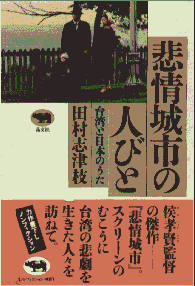
自立副刊,去年(1989)十二月十五日 田村志津枝在「追尋幌馬車之歌」文中提到 「絕大多數的日本人,對於電影(悲情城市) 所出現的九二八以及做為電影背景的 二二八事件毫無所知」值得我們深思 無知與認同之間,原本毋需太多橋樑 「悲情城市」引起的歷史爭議和田村的迷惑 其實正是做為台灣人知識份子最大的悲哀! 解嚴以前,有關二二八事變的調查研究 大都偏重因果分析,甚少觸及文化層面的探究 從表面觀察,可能是當年的傳播媒體,不若今日普及,資訊取得不易 實際上則是當局刻意壓制與淡化所致 解嚴後言論尺度有限制地寬放 不僅未能擦亮史實,反而更因意識形態的激烈衝突 和政經形勢日趨複雜,迫使「糊化」過程加速 而「包裝歷史」的風潮,也從幕後走向台前 (背景音樂: 春花望露 江中清作詞 作曲) On December 15th last year (1989), in the Supplement to the Independent Morning Post, Shizue Tamura mentioned the following words in her article "In Search of the Song of the Caravan" "The vast majority of Japanese don't know anything about the the history of 928 and the 228 Event that was used as the background of the movie For the movie "City of Sadness". It is something we should ponder. Between ignorance and identification, there are not necessary a bridges needed. Historical Controversy Caused by "City of Sadness" and Tamura's Confusion. In fact, it is the greatest sorrow of being a Taiwanese intellectual! Before the lift of martial law, most of investigation and research papers on the February 28 Event focus on causal analysis and rarely touch on cultural exploration. From a superficial observation, it may be that the communication media of the past years was not as popular as it is today, and it is not easy to obtain information. In fact, In fact, it is the result of the authorities deliberately suppressed and downplayed. After the lifting of the martial law, the scale of speech has been relaxed with restrictions. Not only failed to polish the historical facts, but also because of the fierce conflict of ideology and the increasingly complex political and economic situation, forcing the "gelatinization" process to accelerate. And the trend of "packaging history" has also moved from behind the scenes to the front. (Background Music: Tshun-Hue-Ban-Loo, lyrics and music by Kang Tiong-tshing)
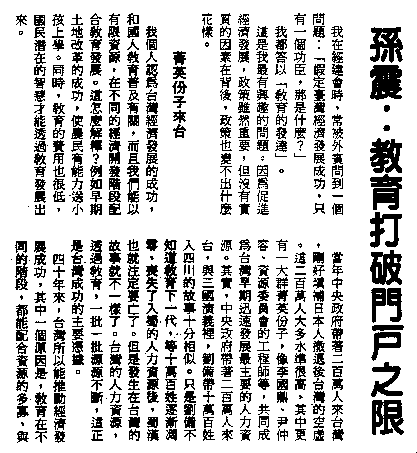
這種現象並不限於,政經,文化,藝術 即使連作風嚴謹的學術界,亦不能免 台大校長孫震接受天下雜誌訪談時曾說: 「當年中央政府帶著二百萬人來台灣 剛好填補日本人撤退後台灣的空虛 這二百萬人大多水準很高...」 飽受戰火蹂躪的台灣人菁英 在二二八事變及五零年代政治肅清運動中,幾被捕殺殆盡 這些空檔「剛好」為大陸人士填補,是事實 然而二百萬人中,因戰亂失學或粗識文字的士兵佔大多數 和孫校長年紀相仿的少年學生也為數不少 說「大多水準很高」,實在令人難解 年輕一輩要關心的不該侷限於二二八事變本身 實應注意四十年思想禁錮,對本土民性和社會的衝擊 田村的研究若能著眼於此,當可重現台灣人被棄置的一面 (圖片資料來源: 天下雜誌 No.81 P.69 七十七年二月) This phenomenon is not limited to politics, economy, culture, art. Even the rigorous academic world is not immune to. Sun Zhen, the president of National Taiwan University said in an interview with CommonWealth Magazine: "The central government brought 2 million people to Taiwan back then. Just to fill the void in Taiwan after the Japanese retreat. Most of these two million people are of a very high level quality..." Many war-torn Taiwanese elite were arrested and killed during the 228 Event and the political purge in the 1950s. It is true that the Chinese "jUST" fill the void in Taiwan after the Japanese retreat. However, among the 2 million people, most of the soldiers were dropped out of school due to the war or had only a rough literacy. There are also many young students of the same age as principal Sun. It's hard to understand that "most of them are of a very high level quality." What the younger generation should be concerned about should not be limited to the February 28 Event itself. Attention should be paid to the impact of 40 years of ideological imprisonment on the local people's character and society. If Tamura's research can focus on this, it can reveal the abandoned side of Taiwanese. (Photo credit: Commonwealth Magazine No.81 P.69 February 1977)
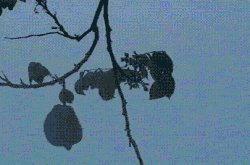
戰後初期,倖存的台籍知識份子 有的低報學歷,有的遠走他鄉 這些人閉口不提二二八 兒女遠行之際,諄諄告誡 不可談論政治,不可參加台獨 不要忘記咱們早在三百年前,背負神祇渡海來台 他們一生做牛做馬,默默工作 胼手胝足的成果,被說成「奇蹟」 坎坷的心路歷程,卻無人聞問 當歷史的見證者,逐漸凋零之際 讓一部像「悲情城市」這樣的電影 來重新包裝他們,是否公平? In the early postwar period, some of the surviving Taiwanese intellectuals underreport their education, and some go abroad. These Taiwanese people keep their mouths shut. When the children are far away, they admonish them earnestly "Not to talk about politics, not to participate in Taiwan independence Group. Don't forget that as early as 300 years ago, we came to Taiwan with our gods on our backs." They are worked silently like cattle and horses all their lives. The result of calluses and feet was said to be a "miracle." No one has heard the ups and downs of their mental journey. When the witnesses of the history gradually disappear, Is it fair to repackage them with a movie like "City of Sadnes"?

「他們望不遠,他們看不深 但是誰能阻住,他們向海凝神?」 不遠也不深 -- 佛洛斯特 -- 果陀何在? 什麼時候,台灣人才能爭脫夢魘,不再讓歲月留白? They cannot look out far. They cannot look in deep. But when was that ever a bar To any watch they keep? Neither out far Nor in Deep -- By R. Frost -- Where is Godot? When will Taiwanese be able to fight their nightmares and stop letting the years go blank?